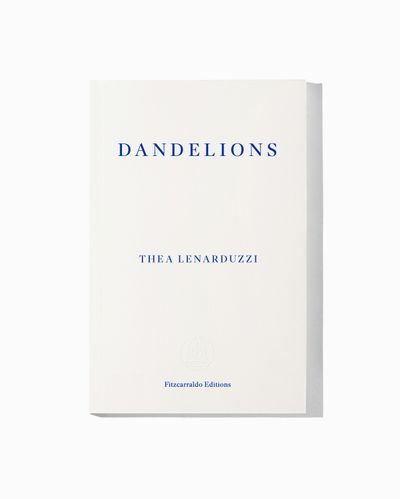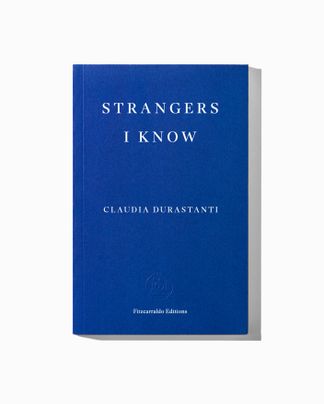Where, or what, is home? What has it meant, historically and personally, to be ‘Italian’ or ‘English’, or both in a culture that prefers us to choose? What does it mean to have roots? Or to have left a piece of oneself somewhere long since abandoned? In Dandelions, Thea Lenarduzzi pieces together her family history through four generations’ worth of migration between Italy and England, and the stories scattered like seeds along the way. At the heart of this book is her grandmother Dirce, a former seamstress and a repository of tales that are by turns unpredictable, unreliable, significant. Through the journeys of Dirce and her relatives, from the Friuli to Sheffield and Manchester and back again, a different kind of history emerges. A family memoir rich in folk legends, food, art, politics and literature, Dandelions heralds the arrival of an exceptional writer: bold, joyful and wise.

Dandelions
French paperback with flaps, 288 pages
Published 7 September 2022
Dandelions
I.
A woman with a soft brown perm walks slowly through tall grasses, between a Co-op distribution centre and an abandoned warehouse. She is far from Maniago, the small Italian town where she was born, where the plains pucker along the seam of the north-eastern Alps. Her dress – a simple, straight-skirted, below-the-knee affair in muted green polyester with, perhaps, some swirling pattern in a pale yellow – almost blends into the surroundings. You wouldn’t spot her but for the occasional glint of a faux gold button on her cuff and the electric pink and blue of her half-apron, with its deep pockets designed to contain the multitudes of needles, threads, thimbles and safety-pins that are the seamstress’s tools. She stops at irregular intervals and bends over, almost double, to pinch her fingers around clumps of leaves and delicately, decisively, pluck. As she straightens, she pushes handfuls of green into a bag before continuing on her way.
It’s probably mid-morning on a Sunday, not long after Mass at St Robert’s Roman Catholic Church on Hamilton Road, where the priest always stops her after the service to thank her for the cake, ask after the boys, or to see if she would like to help with a new family just settling into the area. Any other day, she’d be curved over the sewing machine. The shops are closed so there aren’t many people about. Those who are tend to look over with furrowed brows and perhaps a shake of the head, before moving on. They’re not sure what this woman is up to – has she lost something? – but they know they wouldn’t be caught dead rooting around where stray cats and dogs and Godknowswhat do their business. Now she is alone, but often there is a boy, too – probably no older than twelve, the age at which he starts to think twice about these family customs. His skin is darker than hers, which has its own subtle olive hue, and this causes him grief at school. They have many names for him.
The woman is my grandmother, mia nonna – sometimes with my father beside her, tugging awkwardly at the shorts she made him – and she is picking dandelions to go with the evening meal. She bobs and weaves between the flowers’ perky heads, dotted like asterisks on a densely annotated page.
This is in Longsight, Manchester, sometime in the late 1950s, and it’s one of my prevailing images of Nonna, who is now halfway through her nineties and living back in Maniago. I wasn’t there, of course, so it’s a kind of fiction implanted through decades of other people’s talk. In the family, the story of Nonna collecting dandelions – tarassaco, in Italian; pestonala, pissecìan or radicèla (derived from radici, roots) in the dialects of her native Friuli – has always carried more weight than fact alone. It’s like a well-worn fable, a matter-of-fact fairy tale that doesn’t accommodate requests for supplementary detail about dates and times, relationships or materials. Che importa?, she says, ‘What does it matter?’; a question some would extend to whole lives and cultures.
All immigrants have narratives in which the mundane is ripe with symbolism, centred on moments in which the difference between them and us, the natives and the newcomers, are somehow distilled. We recycle abstruse parables, pass them down the generations, and find in them nourishment, confirmation of something never fully articulated. We keep the lines of the stories more or less straight, because embellishment, like questions, only complicates.
We Italians know how good gently wilted tarassaco tastes, once tossed with salt, perhaps a splash of vinegar or squeeze of lemon, and the essential olive oil, which, in England, you had to buy from the pharmacy back then (t’immagini? Can you imagine?). The British, on the other hand, do not. Dandelion and burdock is one thing, they’d say, picking weeds from a wasteland, something else entirely. So they think we’re mad and we think they are – they’re missing out. Free food! (That dandelion leaves were once a popular garnish among well-heeled Victorians doesn’t quite fit this particular story.)
There isn’t a family without such stories, in fact, whether they have travelled hundreds of miles from home or only down the road. They are a means by which outsiders and insiders are distinguished, often protracted in-jokes that acknowledge or test closeness, belonging, heredity. In Family Lexicon, Natalia Ginzburg’s restrained and radical novel-memoir, published in 1963, the repeated tales and linguistic tics of her relatives trigger in her and her siblings an immediate falling back
into our old relationships, our childhood, our youth, all inextricably linked to those words and phrases … It takes one word, one sentence, one of the old ones from our childhood, heard and repeated countless times… If my siblings and I were to find ourselves in a dark cave or among millions of people, just one of those phrases or words would immediately allow us to recognize each other.
Experience becomes language becomes story becomes identity, and everyone’s place is settled. Each family has its own ‘dictionary of our past’.
A couple of summers ago, imagining myself as an archivist of family lore, I sat down with Nonna, a thermos of coffee between us on the kitchen table to forestall our having to get up for more, the blinds pulled down against the late morning sun, and the rest of the family shooed. I had warned her it might take hours – I wanted to start ‘at the beginning’, meaning her birth, and proceed from there. But no sooner had I tapped the record button on my phone, its mic propped up against a packet of biscuits, than linear time deserted me. Nonna’s memory was in full bloom and would not be tamed by anything like conventional narrative structures. Like an excited schoolgirl, her stories began and ended abruptly in mid flow; topics were conjoined indiscriminately, little and large weighted equally. Words and names were left hanging like loose threads, sometimes accompanied by a gesture, a shake or nod of the head, a shrug or sigh, ‘Ma Pietro…’, ‘eh, si…’, ‘purtroppo…’ But Pietro, oh yes, unfortunately.
Some stories, prompted by yellowed photographs released from ancient rubber bands as brittle as dried linguine, took shape in increments. ‘He was a local boxer, a friend of a friend,’ Nonna said, pointing at one man who towered above her uncles and cousins and their companions, excitedly arranged either side like a billowing cape. ‘And,’ she placed her finger on one smart, smiling man, ‘my father, here.’ He seemed Lilliputian by comparison. Nonna knew little more than that the shot was taken outside a nearby restaurant, probably sometime in the early 1930s. The local boxer, I later discovered with the help of the internet, was Primo Carnera, the Ambling Alp, the Vast Venetian, back home on a visit from America. At the time, he was the heavyweight champion of the world, the tallest anyone had seen. In 1931, he made the cover of Time magazine. Today he is remembered less for his skill than for his associations – with Benito Mussolini, who saw him as a model of Italian masculinity, and with American mobsters, who took control of his career, and probably his finances, bribed opponents and transformed him into a professional ‘monster’. For my family, though, Carnera is a footnote, asterisked in the main story. ‘He died. I don’t know when.’
(…)
‘Dandelions is a book of hauntings, intensely experienced, pierced by occasional terrors, yet irradiated throughout by passionate attachment. Generations of family ghosts wander between Italy and England, their lives summoned from a beloved grandmother’s long memories and the author’s own wide-roaming, often poetic reflections on botany, history and language. Thea Lenarduzzi has spread out before us a feast of sensuous and sensitive, nuanced and deeply appealing testimony to migration, survival, and complicated identities at a time when such thoughtfulness is rare and desperately needed.’
— Marina Warner, author of Inventory of a Life Mislaid
‘Beautifully observed and written with heart and an infectious curiosity, Thea Lenarduzzi’s Dandelions parses the complex ways in which we live out our histories and carry the past within us, through ritual, food, language and legend. Like rifling through an overflowing drawer or opening an ancient photo album, Lenarduzzi unearths glinting gems of family fiction, introducing us to a shifting cast of memorable characters whose journeys, stories and passions it’s our joy to share.’
— Francesca Wade, author of Square Haunting
‘In this subtle and elegant family memoir, Thea Lenarduzzi gathers the ghost seeds between her present life in England and her family’s past in Italy. A meditation on roots, inheritance and homesickness, Dandelions is also a reminder that what will survive of us is love.’
— Frances Wilson, author of Burning Man
‘Dandelions is spellbinding. Like the polished beads of a secular rosary, each bearing a remembrance, Lenarduzzi’s ancestral memoir conjures intimate histories of migration, love, and loss across decades of passages between Italy and England. Her redoubtable grandmother Dirce will lure you in, as she unfolds fragmentary myths with a sly wit, whispering ascolta, “listen” – and you won’t resist.’
— Anna Della Subin, author of Accidental Gods
‘Dandelions is a beautiful, precise and exceptionally intelligent family memoir. In it, Lenarduzzi carefully detangles a complex web of interlocking stories, which she finds to be threaded through with warmth, aspiration and hope. In the figure of Dirce we find a kind-hearted grandmother and compendium of stories both – offering wisdom and familial mythology like a Friulian oracle. Dandelions marks the arrival of a stunning new voice.’
— Cal Flyn, author of Islands of Abandonment
‘This charmingly candid account of the tensions between an English present and an Italian past is also a fascinating family saga, teeming with idiosyncratic life and bringing with it a chunk of history that still conditions both countries today.’
— Tim Parks, author of The Hero’s Way
‘Local dialects, language and superstition, Mussolini, Red Brigades and the trials of immigration are woven through this captivating family memoir as it chases a home across three generations of movement between Italy and England and back again. Lenarduzzi transmutes conversations with a formidable grandmother into a prose of many textures and inflections, giving us a story that is as as rich as it is gripping.’
— Lisa Appignanesi, author of Everyday Madness
‘Thea Lenarduzzi has written a profoundly evocative, lyrical meditation on family and kinship in their largest sense. A Natalia Ginzburg-inspired wandering through the life of her grandmother in pre-war Italy and post-war Manchester stimulates an exploration of home, homesickness, home truths, and homecomings. Lenarduzzi has an impressively patient capacity for acts of sustained attention: the dandelion will never be the same again!’
— Lara Feigel, author of The Group
‘Dandelions is … an overwhelming success. Just as it describes many Italys, it also encompasses many books, and this unusual combination of family memoir, literary enquiry and political history is a triumph.’
— Francesca Peacock, The Spectator
‘As if scattering dandelion seeds, Lenarduzzi writes discursively in precise, metaphorical prose, layering family mythology with fascinating political, economic and social context.… At a pivotal moment when “but Mussolini also did good things” is murmured across Italy, Lenarduzzi’s reckoning with her heritage highlights the way history reverberates in the present. Her timely investigation of Italian identity and fascist legacy illuminates the roots of nationalism the world over.’
— Madeleine Feeny, Financial Times
‘Thea Lenarduzzi’s first book, is a more than worthy work of nonfiction. Mixing the wild and mythical stories told by Thea’s grandmother Dirce – about night-dwelling demons, bloody curses and “Mussolini’s modern Icarus” – with the true tales of four generations of her own relatives, she fuses family memoir and social history in an examination of relationships, botany, architecture, and community ritual.’
— Jenna Mahale, i-D
‘Lenarduzzi’s touching debut, winner of the 2020 Fitzcarraldo Editions Essay Prize, serves up lyrical meditations on food, family, and belonging…. Lenarduzzi’s admiration for her grandmother’s resourcefulness and resilience provides an affecting emotional backbone, and the elegant prose delights…. The result is a ruminative take on what it means to put down roots.’
— Publishers Weekly
‘Lenarduzzi … finds potent symbols amid the phantasmagoria and subtly evokes their haunting power, which endows her work with a fabular quality redolent of Marina Warner.… Lenarduzzi accommodates her family’s experiences without becoming obscure. Ultimately, the book’s greatest strength lies in her willingness to disturb histories previously thought to be settled.’
— Amy Walters, The Saturday Paper
Thea Lenarduzzi is a writer, broadcaster and editor. Her debut, Dandelions, a family memoir and cultural history of migration between Italy and England, won the 2020 Fitzcarraldo Editions Essay Prize and was shortlisted for the Ackerley Prize for ‘literary autobiography of outstanding merit’. The Tower is her second book.




